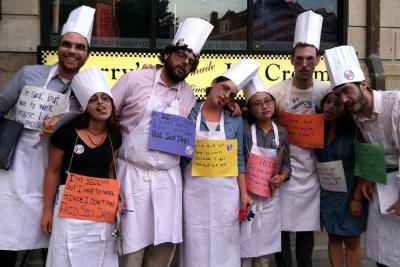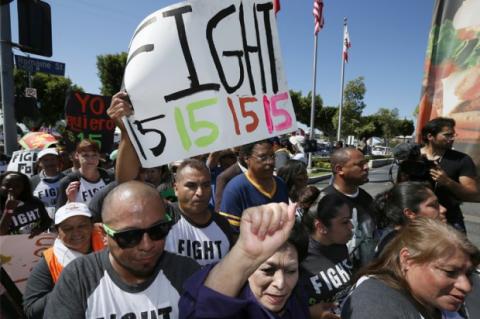Cities Passing Higher Minimum Wages Laws - $11.50 in Metro DC Area and $15.37 in LA for Hotel Workers
- Minimum Wage Raised in D.C. and Surrounding Counties - Katie Ashmore and Monica Kamen in Labor Notes
- Los Angeles moves toward $15.37 wage for hotels - Tuesday vote brings second-largest city one step closer to setting nation's highest wage mandate - Josh Eidelson in Salon
Minimum Wage Raised in D.C. and Surrounding Counties
By Katie Ashmore and Monica Kamen
February 21, 2014
Labor Notes
In December lawmakers in Washington, D.C. and two neighboring Maryland counties voted to raise the minimum wage to $11.50 per hour in all three jurisdictions.
It was a regional cooperation unprecedented in this country. Too often, minimum wage increases are defeated when opponents argue that businesses will flee across city or state lines.
In D.C., the increase was indexed to the Consumer Price Index, so the minimum wage will increase every year. The same day, the D.C. City Council also voted to strengthen its paid sick leave law to ensure that all workers are covered and the law is better enforced. And raising wages in Montgomery and Prince George's Counties gave a boost to the red-hot fight for a higher statewide minimum in Maryland.
In short, December saw the biggest wins in recent memory for workers in the D.C. metro area. Though the bills moved quickly, the groundwork for victory had been laid long before - through fights we lost.
After the D.C. mayor vetoed last year's effort to force big-box retailers like Walmart to pay a living wage, organizers responded by thinking bigger, not smaller.
We set our sights on a citywide minimum wage hike. We flipped the opposition's message so the momentum from the lost campaign would work in our favor. And we jumped on a chance to pitch our umbrella wider, joining forces with groups that had been pushing for paid sick days in D.C. and for minimum wage boosts in the nearby Maryland counties.
Year of Low-wage Workers
Community and labor groups had been organizing for years to keep Walmart from opening six stores within D.C. city limits (we lost) and to make it pay fair wages. Years of work culminated in a 2013 bill that would have forced big retailers to pay a living wage of $12.50 an hour. But the mayor vetoed it in August.
Of course, momentum was building that year for a wage increase for all low-wage workers, not just those at big-box stores. The Walmart strikes and fast food strikes caught everyone's attention, including politicians'. In D.C. the strikers were low-wage employees of federal contractors, such as Smithsonian museum workers. http://labornotes.org/2014/01/one-day-strikes-yield-union-dc
Meanwhile, for two years a coalition of labor and community groups had been building the case for a higher state minimum in Maryland. City and county councils including Montgomery County's passed resolutions for such an increase.

Demonstrators played sick to show the need for paid sick days for D.C. restaurant workers, 80 percent of whom were excluded by a 2008 law. Now tipped workers are included and they're all covered after working 90 days.
Photo: Jews United for Justice.
Groups in D.C. had also started organizing to bolster D.C.'s 2008 sick leave act, which guaranteed some workers up to seven paid sick days. Unfortunately, the law excluded tipped restaurant workers and anyone working their first year on the job - and it was poorly enforced, leaving close to 80 percent of restaurant workers without a single paid sick day.
So the goals were to expand the law to cover everyone, and to step up enforcement.
Regional Approach
Recognizing the momentum for higher wages on both sides of the border, Councilmember Mark Elrich of Montgomery County met with the chairs of the Prince George's County Council and the D.C. Council to envision a regional approach.
They decided to push the legislation in all three jurisdictions, to eliminate any argument that businesses would flee to neighboring counties. They agreed on an increase to $11.50 per hour.
Out of what could have been a great loss came a great opportunity. The same August day as the mayor's big-box veto, four councilmembers introduced bills that would raise the minimum wage for all D.C. workers and strengthen the sick leave law.
For the next three months, groups in all three jurisdictions lobbied their city and county councils. Our coalitions included local unions of grocery and government workers, worker centers, local chapters of the NAACP and National Organization for Women, Jews United for Justice, and many other groups.
The regional deal was crucial - in both Maryland counties, some councilmembers would vote to move the bills forward only once they knew the other jurisdictions were on board, too.
In D.C. we were present at the council building daily, asking community members to call councilmembers to ensure neither bill was weakened. The calls made sure that the paid sick days bill moved on the same timeline as the minimum wage and that no amendments were introduced.
In Montgomery County, through calls we forced the council to abandon a compromise that would have pushed the $11.50 raise back to 2020.
One lesson learned: take advantage of political moments and opportunities. The organizing across the country had brought the minimum wage issue to the fore and created an urgency we were able to use locally.
Also, D.C. election season was beginning in fall 2013 - the majority of councilmembers were running for reelection (or for mayor), making them more vulnerable to our pressure.
Working as a coalition, with groups on both sides of the border and groups working for both issues, proved essential. We coordinated testimony. We enjoyed increased staff capacity and resources. Our turnout efforts doubled when we planned actions together.
[Katie Ashmore and Monica Kamen are community organizers with Jews United for Justice.]
A version of this article appeared in Labor Notes #420, March 2014. Don't miss an issue, subscribe today.
Los Angeles moves toward $15.37 wage for hotels
Tuesday vote brings second-largest city one step closer to setting nation's highest wage mandate
By Josh Eidelson
February 26, 2014
Salon
In a unanimous Tuesday vote, a Los Angeles City Council committee voted to authorize a study on nearly doubling the minimum wage for employees of large hotels in the nation's second-largest city. The L.A. proposal is one of several municipal moves toward raising wages well above the 5-year-old federal rate of $7.25; at $15.37, it would set a local hotel industry wage floor far beyond the $10.10 proposed by congressional Democrats.
"I'm 38 years old," hotel worker Melinda Miyashiro told the committee, according to her prepared remarks. "My husband and I want to start a family - but I can't see how we could afford it."
The proposal for a study - on the "citywide economic impact" of a hotel wage hike, due in 45 days - was introduced last week by L.A. council members Mike Bonin, Nury Martinez and Curren Price. The proposed $15.37 mandate is backed by a coalition including the hotel union UNITE HERE (my former employer), and the union-backed nonprofit Los Angeles Alliance for a New Economy. In a Tuesday email, LAANE deputy director James Elmendorf described the vote as a "pretty simple first step," but said, "We are pleased that they are moving quickly." Carol Schatz, who leads the business group Central City Association, told the L.A. Times last week that her group saw starting with a study as "a great victory," because "We have been saying we understand the reasons you want to do this, but the question is, what are the possible unintended negative economic impacts?"
In contrast, Elmendorf cites a LAANE estimate that the proposed raise would net $71 million in additional spending in the Los Angeles economy. For "low-wage workers," he told Salon last month, "It is the marginal difference between whether they go to the dry cleaners, or whether they go out to ... get a meal, or buy a coffee." Elmendorf defended the proposed particular focus on the hotel industry on the grounds that it was "a sticky industry" unlikely to pull up roots in order to shirk higher pay; "a growing industry where the city has invested billions"; a linchpin of L.A.'s tourism economy; and "one of the top two" in terms of the number of workers in poverty.
Elmendorf credited L.A.'s progress toward a hotel wage law to a mix of national and local pressures, including both the "tremendous energy" of striking fast food and Wal-Mart employees, and a series of L.A.-area wage laws pegged to certain industries, jurisdictions and/or municipal contracts. Previous labor-backed hotel wage hikes covered Emeryville (passed in 2005); L.A.'s Century Boulevard (2007); and Long Beach (2012). Each of those, argued Elmendorf, "have proven successful," but "not enough."
The Los Angeles vote came the same day that Santa Fe, N.M., county commissioners voted unanimously to extend a city living wage law to the whole county, and one day before retail and janitorial workers rally in Minneapolis for a statewide raise. It comes as New York City's new mayor urges the state to authorize the city to raise its minimum wage; Connecticut's governor has proposed raising the state standard to $10.10; a Michigan coalition is collecting signatures to put $10.10 on the statewide ballot; business and labor are headed to court over the scope of a $15 wage law passed in tiny SeaTac, Wash.; the D.C. City Council has unanimously passed an $11.50 measure; President Obama has signed an executive order requiring a $10.10 wage under federal contracts; and a commission established by Seattle Mayor Ed Murray is tasked with bringing the City Council a proposal for tackling inequality.
Mayor Murray told Salon days after his January inauguration that Seattle's public employees "should have confidence" they'd reach a $15 minimum "in the next several months," and that "I think we are gonna get to $15" for the city's private sector workforce also. Local Service Employees International Union president David Rolf, whose international union has been the key player in funding, fomenting and directing the fast food campaign, is co-chair - with Seattle Hospitality Group CEO Howard Wright - of that commission. Rolf last month told Salon that speculation has emerged that if the group is unable to coalesce behind a compromise, pro-business groups would put forward their own "$15" proposal, "that would probably have a lot of exemptions, a lot of tax breaks." Rolf said he found it "interesting" that "even on the business side of things, things are being framed around $15 ... The general flavor of the discussion in Seattle is not $15 versus $9.32. It's how to get to $15."
Rolf credited that momentum to a collision of several factors over the past year, including "absolutely critical" strikes by fast food workers; the SeaTac $15 initiative "that was itself the product of a multi-year union coalition effort"; wage debate in the mayoral election; wage hikes elsewhere in the country; "the surprise election of a socialist council member running on a $15 platform"; and "the underlying fact that we have had 30 years of wage-less economic growth, and ... the last decade has been jobless economic growth." Rolf added, "Politicians generally are relatively late to the party on these things."
[Josh Eidelson covers politics, labor, and inequality as a reporter for Salon. His work has appeared at outlets including The Washington Post, Reuters, Slate, Dissent, and The American Prospect. His reporting on the Walmart strike wave for The Nation received a Sidney award from the Sidney Hillman Foundation. After receiving his MA in Political Science from Yale, Eidelson spent five years as a union organizer for UNITE HERE in Sacramento, Pittsburgh, and Philadelphia. He appears frequently as a commentator on labor and politics on radio and TV. He is based in New York.]


Spread the word